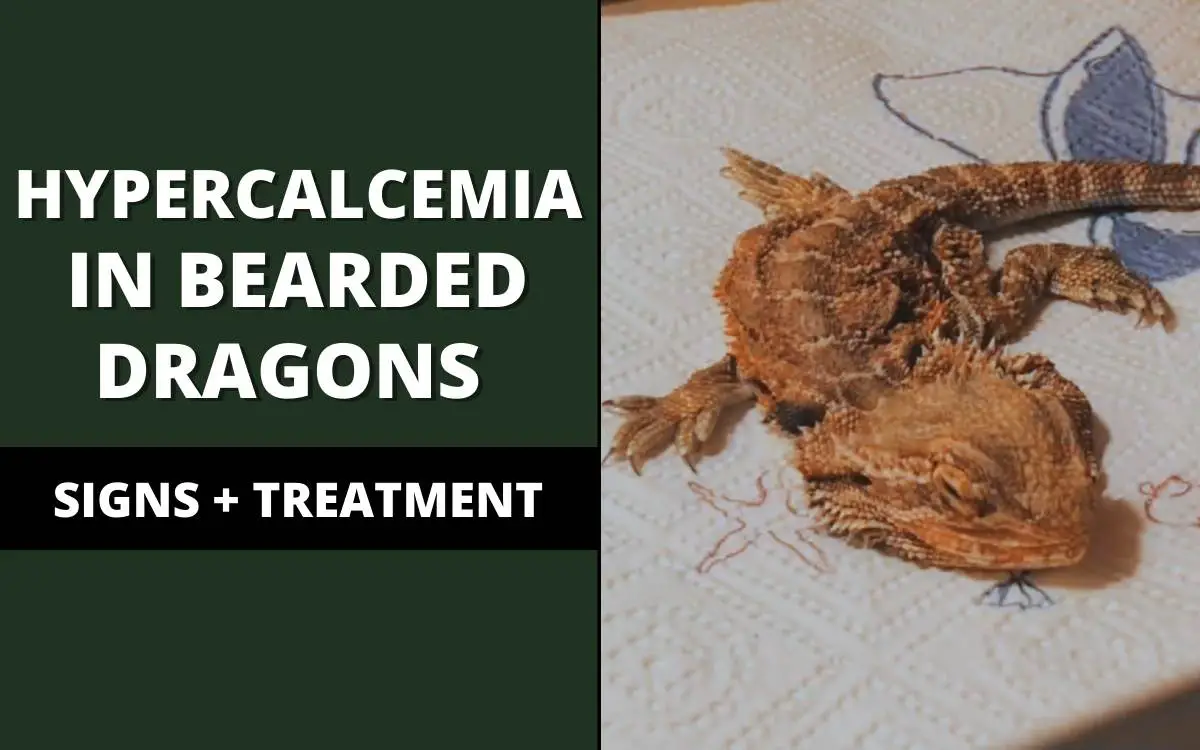Disclaimer: As an Amazon Associate I earn from qualifying purchases. Therefore, we may collect a share of sales from the links on this page, at no extra cost to you!

Hypercalcemia in bearded dragons is a medical condition in which the calcium level in the bearded dragon’s blood is above the normal limit. Calcium is essential for growth in bearded dragons. However, too much of it can impact the beardies health.
Additionally, a lack of calcium in a bearded dragon’s diet can cause severe health complications. It is, therefore, your responsibility as a pet parent to ensure your bearded dragon is getting just the right amount of calcium.
Let’s go over the causes, signs, and treatment of hypercalcemia in bearded dragons. Keep reading to learn how to save your bearded dragon from this potentially fatal disease.
Jump to..
What Causes Hypercalcemia in Bearded Dragons?
Hypercalcemia is brought about by calcium overdose. Nonetheless, it is important to identify the exact factors that contribute to the development of the disease.
An Excess of Vitamin D3 and Calcium
Vitamin D3 is very important since it aids in the absorption of calcium. In fact, calcium won’t be of any importance to your bearded dragon if there is no vitamin D3. Bearded dragons can get vitamin D3 through the food that they eat, supplements, and UVB light.
Too much vitamin D3 in the bearded dragon’s blood increases the absorption of calcium in the gastrointestinal tract. This particularly applies when the bearded dragon is on a calcium-rich diet. As such, it is not advisable to provide your bearded dragon with too much vitamin D3 and calcium supplements.
An excess of vitamin D3 results in increased bone resorption. Bone resorption causes bone tissue to release minerals such as calcium to the blood.
Signs of Hypercalcemia in Bearded Dragons
An increased concentration of calcium in the blood can impact the health of your bearded dragon in several ways. The fact that your beardie has hypercalcemia does not necessarily mean that it will die.
If the disease is detected early, your vet can help you manage it. This can prolong the lifespan of your bearded dragon. Here are some of the signs of Hypercalcemia:
General Weakness
Excess calcium in the blood causes muscles weakness, so your bearded dragon may look fatigued all the time. Hypercalcemia also causes the muscles to become sore. If you notice any signs of discomfort in your bearded dragon, it could be that they are in pain.
Constipation
When there is too much calcium in the blood, the cells tend to lose water excessively, resulting in dehydration. Dehydration is one of the leading causes of constipation in bearded dragons.
Lethargy
Lethargy is often characterized by inactivity and unresponsiveness. It can result from the calcification of blood vessels in the beardie’s body.
The accumulation of calcium salts in arteries and veins can limit blood flow to critical organs such as the brain. This will, in turn, cause the bearded dragon to be less responsive to stimuli.
Note: The above-listed signs can also apply to other health complications in bearded dragons. The best way to know what is wrong with your bearded dragon is by taking them to the vet.
Final Verdict
Providing too much calcium and vitamin D3 supplements to your bearded dragon can cause hypercalcemia. Severe hypercalcemia can lead to bone deformation, kidney damage, and death in bearded dragons.
You can prevent hypercalcemia by feeding your bearded dragon the right amount of calcium. Additionally, you can limit UVB exposure when necessary.
